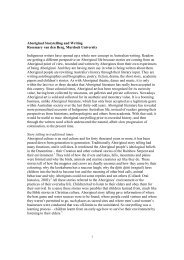Gallipoli, Kokoda and the Making of National Identity - [API] Network
Gallipoli, Kokoda and the Making of National Identity - [API] Network
Gallipoli, Kokoda and the Making of National Identity - [API] Network
Create successful ePaper yourself
Turn your PDF publications into a flip-book with our unique Google optimized e-Paper software.
Hank Nelson<br />
— but now more needs to be said. Keating spoke <strong>of</strong> <strong>the</strong> men fighting for a ‘way <strong>of</strong><br />
life’ <strong>and</strong> about ‘<strong>the</strong> depth <strong>and</strong> soul’ <strong>of</strong> <strong>the</strong> nation being confirmed at <strong>Kokoda</strong>. I<br />
wonder what those things could be? John Howard proclaimed in <strong>the</strong> program <strong>of</strong><br />
action for a coalition government: ‘We will work with multicultural groups to develop<br />
<strong>the</strong> great strengths which derive from <strong>the</strong> diversity <strong>of</strong> languages <strong>and</strong> cultures in<br />
Australian society, <strong>and</strong> to reaffirm <strong>the</strong> strength <strong>of</strong> <strong>the</strong> unifying values we all share’. 26<br />
I wonder what those unifying values are <strong>and</strong> could we be sure <strong>the</strong>y were in <strong>the</strong><br />
minds <strong>of</strong> those who fought from Ioribaiwa to Buna in 1942? It is possible that some<br />
<strong>of</strong> <strong>the</strong> Australians fought to keep Australia white. <strong>Kokoda</strong> was important <strong>and</strong> can<br />
be evocative when associated with <strong>the</strong> broadest levels <strong>of</strong> national sentiment but it is<br />
difficult to associate with specific national aspirations in <strong>the</strong> 1990s. Aspirations we<br />
find difficult to articulate.<br />
Keating <strong>and</strong> o<strong>the</strong>rs had particular political aims when <strong>the</strong>y committed <strong>the</strong>mselves<br />
to <strong>the</strong> ‘Australia Remembers’ program. Expressed in simple terms <strong>the</strong>y wanted to<br />
associate <strong>the</strong> labor government with a surge <strong>of</strong> national sentiment, to tie <strong>the</strong> labor<br />
government <strong>of</strong> 1995 to that <strong>of</strong> Curtin who brought <strong>the</strong> troops back home <strong>and</strong> fought<br />
in <strong>the</strong> region, <strong>and</strong> to taint <strong>the</strong> liberals by associating <strong>the</strong>m with those who wanted<br />
Australia to play a minor supporting role in <strong>the</strong> empire that failed to hold our initial<br />
line <strong>of</strong> defence at Singapore. ‘Australia Remembers’ certainly connected with an<br />
experience that ei<strong>the</strong>r Australians had had, or wanted to learn about, or wanted to<br />
adopt as <strong>the</strong>ir own <strong>and</strong> it defied an exhaustion <strong>of</strong> nostalgia to peak on 15 August<br />
1945: it was successful beyond expectation. There was an enthusiasm for bringing<br />
<strong>the</strong> legend closer to home; Keating <strong>and</strong> Sciacca were praised for what <strong>the</strong>y did <strong>and</strong><br />
<strong>the</strong> speeches that <strong>the</strong>y gave but this did not result in increased support for <strong>the</strong><br />
government. They had fostered a popular nationalism but <strong>the</strong> nation did not respond<br />
with increased popularity for <strong>the</strong> labor government.<br />
The importance <strong>of</strong> war in popular perceptions <strong>of</strong> Australian history <strong>and</strong> Australian<br />
identity remains strong. In 1992 <strong>the</strong> prime minister was able to assert that ‘War has<br />
shaped Australia’s history in <strong>the</strong> twentieth century like nothing else’. This <strong>and</strong> o<strong>the</strong>r<br />
similar statements passed almost unchallenged. The crowds that ga<strong>the</strong>red at <strong>the</strong><br />
thous<strong>and</strong>s <strong>of</strong> public occasions to commemorate fiftieth anniversaries testified by<br />
<strong>the</strong>ir numbers <strong>and</strong> demeanour to <strong>the</strong> significance that <strong>the</strong>y placed on war. O<strong>the</strong>r<br />
countries much more affected by any measures <strong>of</strong> physical damage, numbers <strong>of</strong><br />
deaths <strong>and</strong> dramatic redirections <strong>of</strong> <strong>the</strong> state invested fewer private <strong>and</strong> public<br />
funds into remembering <strong>the</strong> war.<br />
Australians did this although many <strong>of</strong> those at <strong>the</strong> commemorative ceremonies<br />
regret <strong>the</strong> association <strong>of</strong> nationalism with <strong>the</strong> violence <strong>of</strong> war <strong>and</strong> many are aware<br />
that war associates nationalism with men <strong>and</strong> with particular sorts <strong>of</strong> male behaviour.<br />
Australians chose to remember <strong>the</strong> war, although so many Australians by age <strong>and</strong><br />
by origin have no memory <strong>of</strong>, or family connection with, <strong>the</strong> second world war in<br />
Australia. Yet Australians have been unable to give what Australians fought for in<br />
<strong>the</strong> second world war a particular meaning for <strong>the</strong> nation now. The crowds <strong>and</strong> <strong>the</strong><br />
media reports have responded more to human qualities — those displayed by <strong>the</strong><br />
nurses on Banka Isl<strong>and</strong> or <strong>the</strong> men on <strong>the</strong> Burma-Thail<strong>and</strong> Railway — ingenuity,<br />
shared adversity, heroic selflessness <strong>and</strong> a stoic determination not to be destroyed<br />
by any man, physical hardship or disease.<br />
158


![Gallipoli, Kokoda and the Making of National Identity - [API] Network](https://img.yumpu.com/31766380/11/500x640/gallipoli-kokoda-and-the-making-of-national-identity-api-network.jpg)
![Dream and Nightmare in William Gibson's ... - [API] Network](https://img.yumpu.com/49298598/1/184x260/dream-and-nightmare-in-william-gibsons-api-network.jpg?quality=85)

!['Fuck All Editors': The Ern Malley Affair and Gwen ... - [API] Network](https://img.yumpu.com/42446228/1/184x260/fuck-all-editors-the-ern-malley-affair-and-gwen-api-network.jpg?quality=85)
![Polona Petek - [API] Network](https://img.yumpu.com/40542952/1/190x245/polona-petek-api-network.jpg?quality=85)
![to download as a PDF. - [API] Network](https://img.yumpu.com/35170825/1/184x260/to-download-as-a-pdf-api-network.jpg?quality=85)
![Edward Koiki Mabo: The Journey to Native Title - [API] Network](https://img.yumpu.com/33197148/1/184x260/edward-koiki-mabo-the-journey-to-native-title-api-network.jpg?quality=85)
![Indigenous Knowledge and Pharmaceuticals - [API] Network](https://img.yumpu.com/24108846/1/184x260/indigenous-knowledge-and-pharmaceuticals-api-network.jpg?quality=85)
![Ferals: Terra-ism and Radical Ecologism in Australia - [API] Network](https://img.yumpu.com/13809010/1/184x260/ferals-terra-ism-and-radical-ecologism-in-australia-api-network.jpg?quality=85)
![Big Chief Little Wolf: Wrestling, Radio and Folklore in ... - [API] Network](https://img.yumpu.com/12204748/1/184x260/big-chief-little-wolf-wrestling-radio-and-folklore-in-api-network.jpg?quality=85)
![Dark Tourism and the Celebrity Prisoner - [API] Network](https://img.yumpu.com/4348795/1/184x260/dark-tourism-and-the-celebrity-prisoner-api-network.jpg?quality=85)